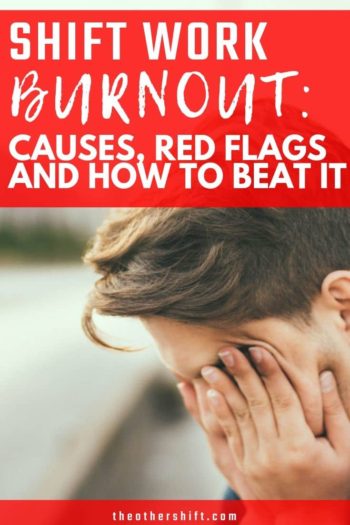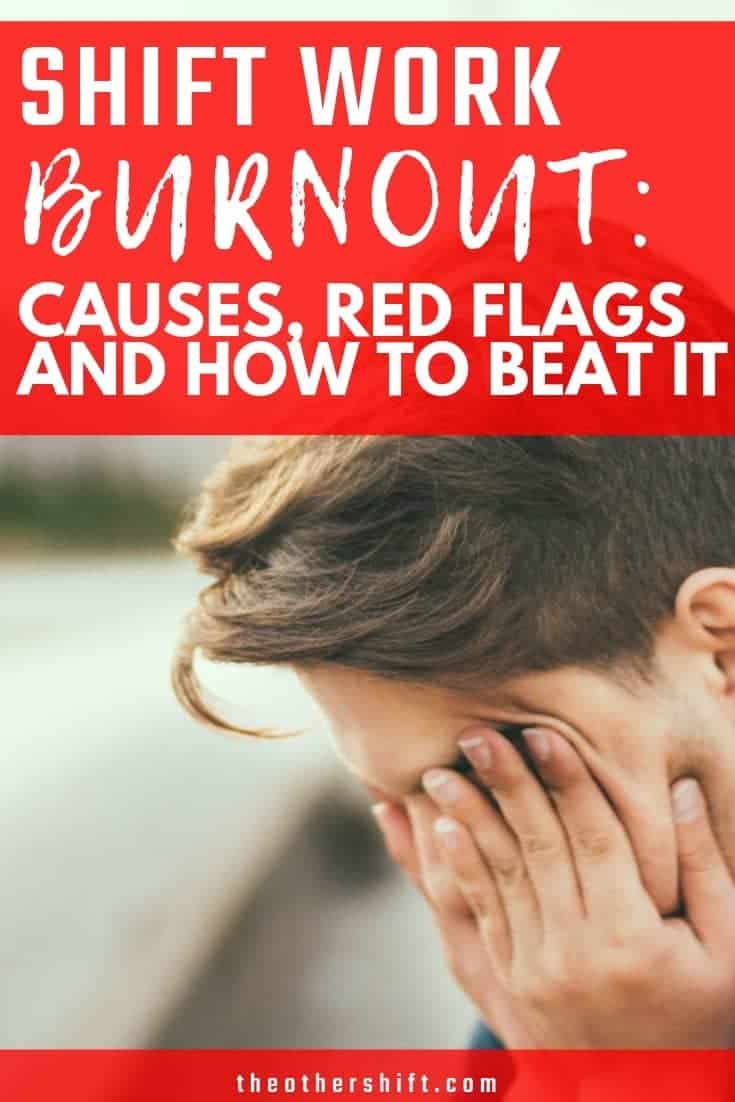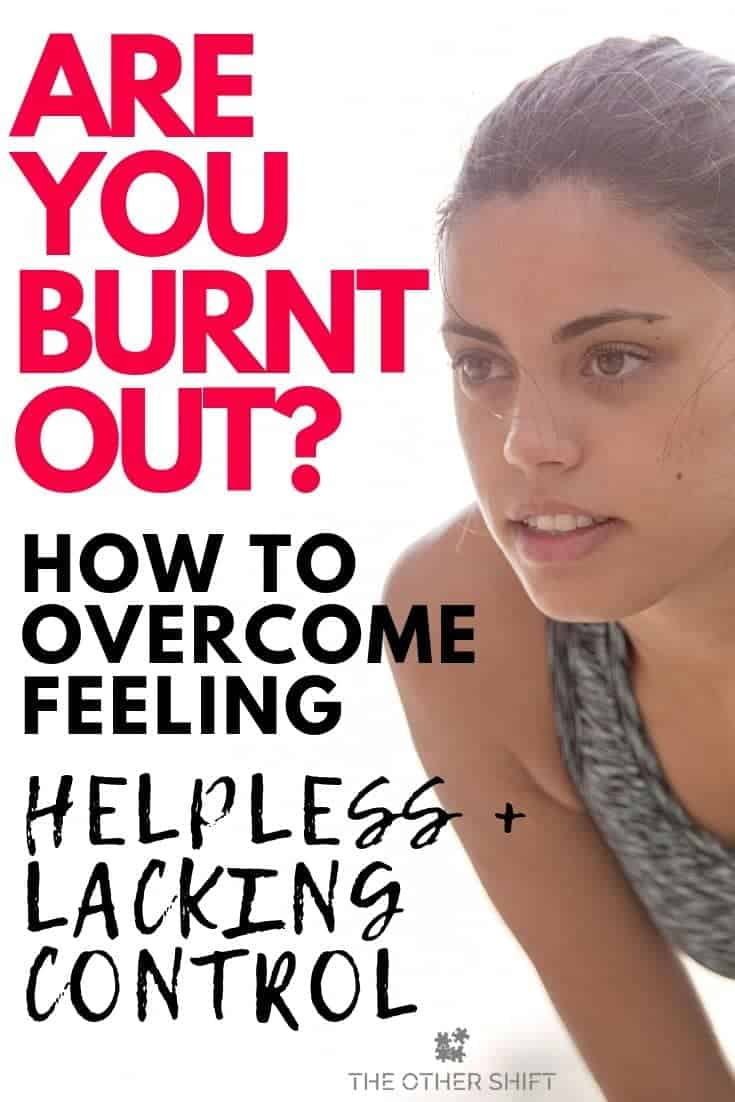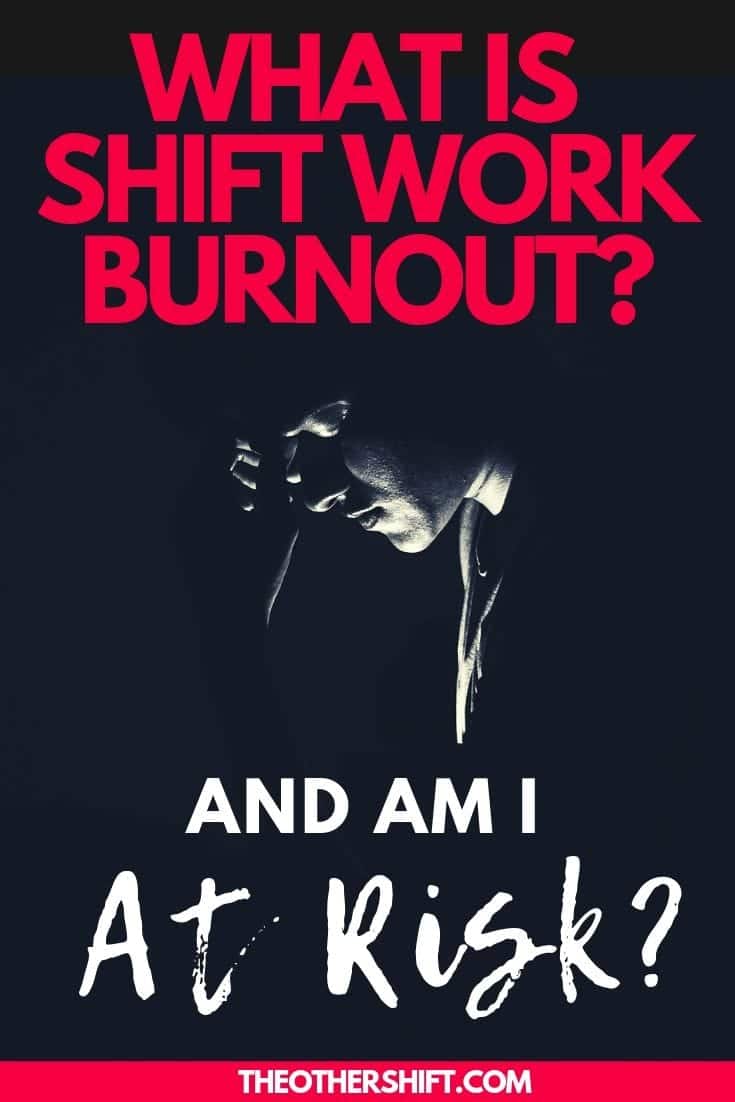Disclosure: This page may contain affiliate links, meaning we receive a commission if you decide to make a purchase through our links, but this is at no additional cost to you. Please read our disclosure and privacy statement for more info.
You’ve just looked at the clock and you’ve been on the job now for 7 hours with no rest. Is your shift work schedule or night shift job leading you to do the same thing over and over again without taking reasonable breaks? Are you feeling hopeless and catching yourself thinking, “I just don’t care about this job anymore.” Then let’s talk about shift work burnout.
Shift work burnout is when you physically, emotionally and mentally cannot complete your job anymore, displaying a lack of curiosity and passion. These feelings, particularly seen in veterinarians and the ambulance and fire services are often due to long-term, unresolved stress without reasonable breaks.
I love my shift work nursing job and I am very passionate about the work I do. But this passion cannot be sustained without recharging my own batteries on a regular basis and prioritizing myself.
This post will explore the ins and outs of shift work burnout. What it means, the causes, red flags to be aware of and what we can do if we happen to find ourselves in a downward spiral.
What is Classified as “Burnout”?
According to the World Health Organisation (WHO), “burn-out is a syndrome conceptualized as resulting from chronic workplace stress that has not been successfully managed”. (source)
To me, this means working the same stressful job for a long time without breaks or resolution of stress, leading to a point you feel empty, lost and cannot continue in the same job anymore.
Interestingly, the WHO also says that,
“burn-out refers specifically to phenomena in the occupational context and should not be applied to describe experiences in other areas of life”. (source)
Again to me, this means shift work burnout is specifically targeting your work. Yes, shift work burnout can have a direct effect on your home and social life, but the key here is the problem starts in the workplace and not the other way around.
A staggering $125 billion to $190 billion (estimated) in healthcare spending each year across the United States is spent on treating job burnout. The media is now labeling burnout a “crisis rampant in the modern world”. (source)
Yikes!
After doing a bunch of reading and trolling through often bland, but pretty important medical lingo, burnout appears to be made of three distinct parts.
- Emotional and physical exhaustion, lack of energy and a “I just can’t do this anymore” type of attitude.
- Emotional detachment is where you lose the feeling of caring and curiosity for your work
- Lack of accomplishment and thinking the work you do is never good enough.
But here are a few more symptoms suffers of burnout report:
- Feeling like “I have to get out”
- Loss of feeling in control
- Significant decrease of any sense of achievement
- Insomnia and difficulty sleeping
- Frequent mood changes, irritability and anger
Men vs Women
Studies suggest women are more likely to experience higher rates of burnout than men. This is potentially due to women managing a household while juggling work but also historically striving for management and authoritative positions with little success of appointment.
How Does Shift Work Burnout Differ? It This Syndrome a Real Thing?
The truth is that there is currently no defined definition to differentiate the two types of burnouts – and if they differ at all.
The feelings of sufferers are similar and how people recover, the journey they need to endure all looks pretty much the same too.
But what is alarming, is that shift work is associated with high rates of burnout and I think we need to talk about it.
Particularly shift work professions in the service and caring industries, such as those listed below, have reports of high rates of burnout:
- Medicine
- Nursing
- Care Staff
- Social Workers
- Police officer
- Fast food staff
- Mental health workers including Psychologist and Psychiatrists
- Attorney
Why Is This the Case? What Are the Causes of Shift Work Burnout?
There has been plenty of research and questions raised about this in the hope of finding a solution – and fast. We don’t want all the doctors, nurses and police offers jumping ship or worse, becoming so sick and withdrawn they don’t find pleasure in any part of the job anymore.
Here are some reasons why shift workers in these industries are specifically thought to become burnt out quicker and in larger volumes than those working in 9-5 jobs.
- Irregular hours and “mandatory overtime” potentially lead to sleep deprivation and lack of time to do the things they enjoy
- Not wanting to appear unwell, tired or anything from 100% healthy in the fear of being viewed as unprofessional, leading to disrespect by peers or the patient/public.
- The continuous stress of these supportive, caring jobs is relentless. There are always sick people in the hospital waiting room and always a law to protect them – at any hour of the day. The job never stops.
- Driven by ambition (particularly in medicine) to be perfect and be respected by your colleagues in order to progress. This is often perceived as you must work harder than anybody else to “get it done” and be perfect
- The psychological effects of shift work can be nasty due to the high risk of sleep deprivation and disruption to our circadian rhythm (body clock).
- Staff shortages lead to guilt if shifts are not picked up and overtime not completed. This is then complicated by lack of financial reward for hard work and long hours in some professions.
Is there a link between the type of shift and level of burnout?
Not really. But interestingly, one study did identify that “critical care nurses with fixed shift schedules display more burnout compared to those working with rotating shift schedules”. The risk was heightened when the nurse-to-patient ratio was also high.
Other Causes of Burnout Commonly Reported:
- Poor leadership, unfairness and lack of organizational caring – “do more” “give more” and emotions of “I feel like a cog in a wheel”
- A disconnect between the day staff and night staff
- Lack of social reward (your colleague’s acknowledgment), not just financial rewards
- Unethical or illegal requests putting workers in a “no-win” situation
- Work overload (long hours, overtime, minimal breaks between shifts)
- Poor contingency plans in place when things don’t go to plan
- Stressful deadlines and expectations which are often unachievable
Burnout vs Plateauing
It’s important not to confuse the two. During burnout, the shift worker is affected physically, emotionally and mentally whereas a person in a plateau stage feels stagnant, bored and frustrated. Self-esteem and self-worth remain strong, unlike what is reported during burnout.
What About Night Shift Burnout?
While the rate of burnout in night shift night is comparable to day shift, some say the extra pay, quieter schedule and less stressful environment (industry-specific) can have a positive impact on minimizing burnout.
Do Particular Personalities Get Burnt out Quicker?
- High achievers
- Perfectionistic tendencies
- “Nothing is ever good enough” type attitudes
- Pessimistic view of yourself and the world
- The need to be in control
- Very reluctant to delegate tasks to others
Why? These driven, often type A personalities are people striving for perfection – constantly.
“If I’m not working I’m feeling lazy!”
They are overwhelmed with needing to perform their best at all times because they are worried about how they will be viewed by others. But more so, how they view themselves by their own high standards.
This often leads to more work after hours, saying yes to overtime when the unit is short (even when exhausted) and giving up weekends with your friends and family to do another shift – even if you’re totally wrecked
Shift work burnout is not a phrase created to start an “anti-work movement.”
Having a driven personality can be a nasty double edge sword.
We need passion to be creative and stay motivated, but we also need to be driven and hard-working to reach our goals, find meaning in our lives and help other people.
So where is the line in the sand? How much is too much?
It’s an interesting question with a range of different opinions and variations.
Some say you need to push yourself to the “edge” to know where it is in order to put boundaries in place to ensure you NEVER cross the line again.
Whereas others take a more cautious, proactive approach by being on the lookout for red flags. Acting proactively when you see or feel one by taking a break and giving yourself a time-out.
It’s a fine balance, but I am drawn to option two. Why? In my opinion, burnout is not something to mess around with by pushing the limits. It’s too dangerous.
Researchers say it can take up to 2 years to overcome feelings of being burnt out even if you’ve removed yourself from the job and environment years prior.
The bottom line here is we are all different and you need to find your own limit where enough is enough and it’s time for a break.
But what we do all have in common is our body and mind sends us signs, or as I like to call them “red flags”, we need to be aware of. These tell us we are on a slippy slope and it’s time to stop!
“Red Flags” Or Symptoms of Burnout to Watch For?
These are similar to the symptoms I mentioned earlier, with these traits being identified earlier in the burnout process.
If you start to find yourself doing or feeling these emotions it’s time to stop, have a break and re-align your priorities.
- Comparing “how bad” or “how few” hours sleep you had with a work mate eagerly, like it’s a competition you need to win
- Running at full speed every single day without having a finish line in sight
- Limited to no curiosity in finding out the “why” in your job
- Loss of compassion in your work, the public and/or clients
- Having a “I just don’t care anymore” attitude
- Finding it impossible to delegate. Telling yourself, “I can’t let go otherwise everything will fall apart”
- Becoming annoyed at things which would normally not frustrate you
- Ignoring the need to take a time out as you are scared to “drop the ball”
- Feeling the need to be constantly admired by others for working the hardest and the longest.
Keep reading – Wanting to Quit Shift Work? 13 Signs Change is Required
The “sprint” should only be temporary
Hard work and long hours may be necessary in the beginning to get a project off the ground, but this should only be short term. There needs to boundaries and a “stop, you’ve made it” point where things must slow down.
How Do I Know When I Am a Burnt Out Shift Worker?
I have always wondered when people say they are “burnt out”, does this mean they just need a holiday or a long nap to recover? Or is it a little more involved?
The vagueness and ambiguity of the whole concept is confusing to me.
But what is clear after doing a bunch of research is that you can’t “sleep away” burnout by having a few good nights rest on your days off.
It’s not that easy, unfortunately.
What blew my mind recently is the WHO has classified burnout as a legitimate medical diagnosis where doctors can diagnose you with “burnout” and provide treatment options accordingly.
This is huge and obviously a bigger deal than I personally first thought.
The symptoms that somebody who is burnt out would present with are similar to the points I gave earlier in:
- Feelings of energy depletion or exhaustion
- Having a negative view of their job and not wanting to go back to the next shift
- Reducing feelings of self-worth in the job they are doing
But before doctors can jump to the conclusion “you have burnout”, diligent testing and assessment needs to happen to rule out other disorders such as adjustment disorder, anxiety and mood disorders. Again, as I mentioned earlier, the diagnosis needs to be strictly related to the stressors in the work environment and not life outside the workplace.
Learning to say “No”
My boss once told me during an appraisal, I need to learn how to say no. I didn’t understand it at the time but I’m starting to see being everything for everyone as a nurse is, in the end, detrimental to my own health, colleagues and patients. Are you okay with saying no?
What Is the Issue With Being Burnt Out?
Interestingly, the Japanese call it “Karoshi”- Death from being overworked
Along with having an emotional impact, such as a lack of motivation and detachment from others, there are also measurable issues seen in regards to burnout such as:
- A high rate of errors in your job.
- Increased turnover in staff
- More sick leave
But there are also physical implications too like a higher risk of:
- Type 2 diabetes
- Heart disease
- Stomach and digestive issues
- High cholesterol
…And yes, it can happen to anyone – even in young people just starting out working!
In a recent post we wrote titled, “Is Night Shift Bad For You? 11 Truths Uncovered“, we go into great detail about what it feels and looks like for the body to be in a constant state of stress. The same is happening here.
When we are stressed without ever having a break, the hormones and chemicals inside our body are trying desperately hard to find balance and a solution to the stress. But all this hard work is exhausting causing us to be diagnosed with chronic diseases at a higher rate such as diabetes and heart disease.
The comical thought that you often hear from hard working people “I’ll take a break when I’m dead” could, unfortunately, be a too soon reality.
Hustle with conscious intention
It takes discipline to do less when you are driven by results and are passionate about something. Everyone has their own line in the sand, so find out where yours is and be very aware when you’re approaching it.
Stages of Burnout
The number of stages in regards to burnout varies depending on who you talk too. Some say there are three while others are saying there are a whopping 12!
Three seems much easier to digest the average person, so I’ll go with that. However, these key categories have been broken down into more detailed parts.
- Stage 1: Stress Arousal
- Stage 2: Energy Conservation
- Stage 3: Exhaustion
Stage 1:
You will notice you’re becoming irritable, anxious and having trouble sleeping. You may also experience high blood pressure, forgetfulness, difficulty concentrating and complaining of regular headaches. Your colleagues may notice you snap at things easily and become angry over the smallest of issues.
Stage 2:
You start to become distant and “not caring” anymore. You may be increasingly late for work, procrastinating about tasks you’d normally not have a problem doing quickly and feeling tired all the time.
Your friends may also notice you’re not coming out as often but you’re drinking a ton of coffee, energy drinks and alcohol at odd times.
Stage 3:
Is where the situation is dire. You constantly have a grey cloud over you, showing depressive symptoms (made worse if you already suffer depression), you may complain of stomach pain and bowel problems and your head constantly pounds with horrible headaches.
People in this stage want to be alone with limited social contact. During this phase, you’ll have trouble getting out of bed which can last for a few days or more depending on the person.
There is no hard and fast rule for how long people stay in each stage. It’s dependent on the person and their support network.
But what do you do when you get to stage three? Let’s find out next.
What to Do When You Feel Burnt Out
While the descent into burnout can be fast, the recovery is normally slow and complex – but not impossible with time and dedication.
You might hear people say, “just go exercise, eat a healthier balanced diet and have a good sleep and see what happens”.
While these strategies are healthy and will boost your overall well being they are not specific enough to treat burnout.
We need to take into consideration ALL the parts of our health and wellbeing affected by burnout specifically:
- Physical health
- Emotional health
- Mental health
Here are the steps to recovering from burnout:
Realize You Are Burnt out and Accept It
This can be the hardest part and can take a while to fully understand. You may reach “breaking point” yourself or hopefully dodge it by being told you need to stop either by a close friend, family member or even health professional.
It’s at this point, your lack of motivation for almost everything is not only impacting on your work but also your relationships and health.
- In this point, it’s critical to stop and focus on you and not what others expect from you
- Use a journal. You’ll want to be alone and not talk to anybody in this stage. So writing down your thoughts can be a great stress reliever and help you find clarity
- Physical or psychological removal from a situation
Once you are aware you are burnt out, you need to get out. Remove yourself from the environment which is causing you stress.
Your options are to quit or stay. Quitting, though it might seem like the best option, might be avoidable after some time away from work, post discussion with your employer.
- You need space and distance at this time in order for you to understand and see the situation you’ve got for yourself. The amount of time you need away can vary but is usually anywhere from a few days to a month.
- Understand what is causing your burnout
Using the support system around you such as your therapist, psychologist or even a close family member or friend can help you figure out what went wrong.
What caused you to become out of sync with what you know is important?
- These people may not “fix” the problem but they give you the opportunity to talk without judgment.
- Pick somebody who doesn’t get distracted and really listens.
However, in order for this part to work, you must not try to prove the listener wrong. Be open to hearing where you’ve fallen short in order to move forward. This can be hard particularly when you feel so passionate about your job and what’s expected of you but you need to overcome this.
If you do venture down the quiting line due to burnout, here is what comes next.
Listen to Your Body
This is where the health advice I mentioned earlier comes into play.
Prioritize your body’s health in order for it to give you the positive results you’re looking for.
- Healthy eating (fresh fruits and veggies and less food which comes from a packet).
- Getting out into the sunlight
- Staying hydrated
- Taking a vacation or even a leave of absence away from the stress allows you to re-balance and figure out where your priorities are.
- Regular exercise
- If you are angry or frustrated try boxing, kickboxing, power weights or anything which requires you to have guts and aggression. This is a safe, effective way to release emotions boiling up inside you.
- Identify your values and priorities
When you are burnt out, what you think is important becomes out of sync and potentially not what you really want long term. Use the vacation time and leave to re-establish what’s important to you.
- Self-analysis here seems scary but can be a very refreshing re-start.
- Develop contingency plans for competing priorities in the future
- Put in place firm boundaries to stop this happening again in the future. This takes time AND effort and will not be a quick fix so be prepared.
Or try the “three R” approach to manage burnout
Recognize: Watch for the warning signs and red flags of burnout.
Reverse: Undo the damage by seeking support from professionals and also those around you to help manage stress.
Resilience: Build your resilience to stress by taking care of your physical and emotional health
Other Helpful Tips to Treat Burnout When Developing a Treatment Plan:
- Hang around positive people and avoid the drama
- Distance yourself from the workplace when on “you” time. Remove work emails on your phone.
- Don’t look at your work emails in the first hour of waking up or in the two hours before bed
- Prioritize getting 7-9 hours of sleep each day (or night). Our brains, specifically the part responsible for reasoning, planning and memory can shrink or atrophy when we are sleep deprived.
- Avoid similar events and environment for at least the next year
- Can you alternate onto the day shift routine?
- Charge your phone outside the bedroom and use a traditional alarm clock instead if need be
- Don’t be afraid of mindfulness and using motivational tools. Yoga, stretching, meditation and motivational videos are amazing
If you are the employer – this post will help reduce employee burnout and boost morale.

Be Aware of Residual Burnout
Even after 2 years of leaving the job or moving positions, triggers can cause you to experience burnout again but normally to a lesser extent. But since leaving the job/environment you’ve developed a better understanding or yourself and ability to cope.
Shift Work Burnout Recovery Moving Forward
Burnout is Treatable
I want you to feel “whole again” as quickly as possible and for you to be excited about what tomorrow will bring.
This can either be a fresh start in a new job or back where you were in a different role with a new schedule and expectations.
I believe avoiding burnout comes down to knowing when to push yourself, when to slow down and putting in boundaries to prevent burnout from happening again.
But the challenge is trying to mesh together, “what do I want life to look like?” and “how can I succeed in my job?”
To answer that question and start on a new road, I once heard a great analogy using our cell phone I want to share.
An Important lesson I learned from my cell phone about burnout
When our phones are “in the red”, with only 5% battery left, we panic and quickly plug it in before it “dies”. This generally boosts the battery back to about 20% and we go again. Until the pack is at 5% and we repeat the above process.
Overnight we always plug in our phone as we sleep so it fully recharges to 100% to last the next day, right?
We need to do the same with our body’s.
Most people, when noticing they are overwhelmed, tired, frustrated and in a “slump” – like when our phones are at 5%, do take time for a break. But are they doing the things to get back to 100% or are they constantly running on near empty and trying to top up the energy source as they go?
A vacation (even a small one), time away from social media, laughing with friends or just “getting away” from the environment will give you a boost. But sleep is the most critical factor. Combining the above with a solid few days where you prioritize sleep, eat a healthy diet and stay hydrated will contribute significantly to boosting your own battery back to 100%.
You wouldn’t like to start your day with a phone battery of less than 10%, so don’t do the same with your body.
VIDEO – This is a great, very real and informative video regarding burnout which is worth watching to sum up this article.
Remember the duck on the pond analogy?
What looks like simple, seamless and easy success on the outside is only a facade of what is actually going on. The duck is kicking like mad to stay afloat. It’s okay to be the duck sitting on the bank, lazying in the sun from time to time.
Also, Night Shift Rut: Break the Cycle and Get Your Life Back is another article we wrote to help you get back on track. Take a look here
Book recommendations from Amazon.com Regarding Burnout
- For doctors: Doctor, Heal Thyself: A Guide for Physicians to Prevent Burnout and Promote Wellbeing

- For nurses: Stop Nurse Burnout: What to Do When Working Harder Isn’t Working
- For police: Increasing Resilience in Police and Emergency Personnel

- For moms: Mommy Burnout: How to Reclaim Your Life and Raise Healthier Children in the Process

- For everyone: Burnout: The Secret to Unlocking the Stress Cycle

Keep Reading…
- Medication review: Insomnia And Shift Work Sleep Disorder Medication Review
- Sleep aids: 10 Must-Have Night Shift Sleep Aids for a Heavenly Sleep
- Alarm clocks: 7 Best Alarm Clocks For Night Shift Workers
- Sleep music: Sleep Music Facts, Playlists and Songs for Insomnia Sufferers
- Falling to sleep when you’re not tired: How to Fall Asleep Quickly Even When You’re Not Tired
- Lavender: Embracing Lavender is the Key to Sleep for Shift Workers
- Shift Work Sleep Disorder (SWSD): Shift Work Sleep Disorder (SWSD) – What Is It and How to Avoid It?
Summary: Shift Work Burnout: Causes, Red Flags and How to Beat It
It seems the attitude, “it’s your fault – you don’t know how to deal with stress” is a thing of the past. We have to move on from this and into a world where we support having meaningful breaks, taking our vacation/leave and speaking openly when feeling like we can’t go on any more.
Burnout is not only treatable but also preventable if we are aware of the red flags and take action when we feel out of control.
What are your thoughts on shift work burnout?
If you’re a carer and feeling burnout, this post titled, Caregiver Burnout: Help for Those Helping Others is for you.
Cheers,

Disclosure: This page may contain affiliate links, meaning we receive a commission if you decide to make a purchase through our links, but this is at no additional cost to you. Please read our disclosure and privacy statement for more info.







Hi Emma,
Thanks for the research.
Wondering if you may know of research material which addresses Hospital Chaplains doing OnCall (16.hrs) after their regular shift and then going back to work the next day – ?
Hi James,
Thanks for your comment. No, I don’t specifically have any research material on this topic. However, research done in the area of overtime is likely to be relevant I’d assume. If you have a specific question relating to this where we could help, feel free to email us at [email protected]. Cheers, Emma